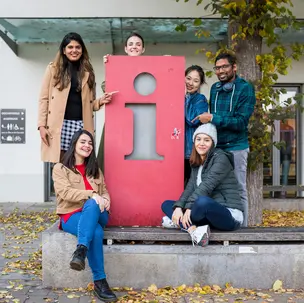How Do I Apply?
Application Check List of the International Office
Translations
Documents in English do not have to be translated.
Documents in other languages must be translated into German, and the translations must be officially certified. The translation must be prepared from the original document.
If you have the translation done in Germany: List of officially authorised translators in Germany.
International Office Application Deadlines

The following application deadlines apply:
- Persons with citizenship outside the EU/EEA:
15 January for applications for: undergraduate programmes (bachelor's, teacher training); German Course for Study Purposes; short-term non-degree study programme; Studienkolleg (preparatory college)
- Persons with EU/EEA citizenship:
- 15 January for applications for: German Course for Study Purposes; short-term non-degree study programme; Studienkolleg (preparatory college)
- Applications for undergraduate degree programmes (bachelor's, teacher training) are possible until the end of the enrolment period.
The completed application must have been submitted in the application portal by the above mentioned deadlines. Late applications, incomplete applications and all associated documentation cannot be accepted after the deadline.
The earliest submission date for applications for the winter semester is mid-May of that year. The earliest submission date for the summer semester is mid-November of the previous year. Applications prior to these dates will not be accepted or reviewed.
Where Do I Apply?
The University of Bamberg is not a member of http://www.uni-assist.de/.
Non-German citizens and those with university entry qualifications (certificates) from abroad must apply via the application portal at the International Office (exception: prospective Master’s degree students); this also applies when you have passed the pre-university examination at a Studienkolleg (Zeugnis über die Feststellungsprüfung):
- Applications for undergraduate courses (Bachelor’s, teacher training); German Course for Study Purposes; short-term non-degree study programme (Kurzzeitstudium ohne Abschlussm?glichkeit); Studienkolleg: Initial inquiries only via the contact form, E-mail only for applications already submitted
- Applications for doctorates: (Mr) Dr. Andreas Weihe, e-mail: andreas.weihe(at)uni-bamberg.de
? Please send your specific questions about the application procedure and the deadlines here.
In the following cases, please apply separately online to the Trust for Admission to Higher Education (Stiftung für Hochschulzulassung)(this only applies to persons with a direct university entry qualification, not for applications to the Studienkolleg München):
- You wish to apply for the first semester of the Bachelor degree of 球探足球比分 (Psychology).
Attention! Please find current information on application deadlines on the website of the Trust for Admission to Higher Education (Stiftung für Hochschulzulassung) or in our application check list.
In the following cases, please apply to the Registrations and Admissions Office (Studierendenkanzlei):
- Applications for Master’s degrees (information on Master's applications), e-mail: master.studierendenkanzlei(at)uni-bamberg.de
- Applications by students with a German school leaving certificate ('Bildungsinl?nder/in'): You received your school leaving certificate (Abitur: Allgemeine Hochschulreife) in Germany, or at a recognised German school abroad. (This applies to prospective students with either a German or a foreign citizenship). IMPORTANT: Applicants with a foreign citizenship who have passed the pre-university examination at a Studienkolleg (Zeugnis über die Feststellungsprüfung) must apply at the International Office!
- Applications by German citizens: Either you are a German citizen, or you have dual citizenship, one of which is German. If your native language is not German, you must have passed the DSH or an equivalent German proficiency examination.
Degrees Offered
Overview of the degrees and courses currently on offer.
For information on individual degrees and courses, please contact the Student Advisory Service (Zentrale Studienberatung) and/or the Subject-Specific Advisory Service (Fachstudienberatung).
The ‘UnivIS’ information database offers an overview of all courses for all semesters and a list of contact persons with telephone numbers and e-mail addresses for the entire University of Bamberg.
The University of Bamberg offers a range of degree programmes which provide teacher training for those wishing to teach at German public schools; overview.
Under the following headings you can find detailed information on the various teacher training options:
As a rule, all subjects can be studied at doctorate level; detailed information and support.
Admissions Restrictions "Numerus Clausus" (NC) and the Allocation of Admissions
The number of study places for some courses is restricted. To find out whether a course is restricted, please refer to the homepage of the degree programme.
Grades from abroad are converted into a German average grade. Study places are granted to applicants who have the highest average grades.
At the University of Bamberg, 5 % of courses that have restricted admission are reserved for applicants from non-EU and non-EEA states.